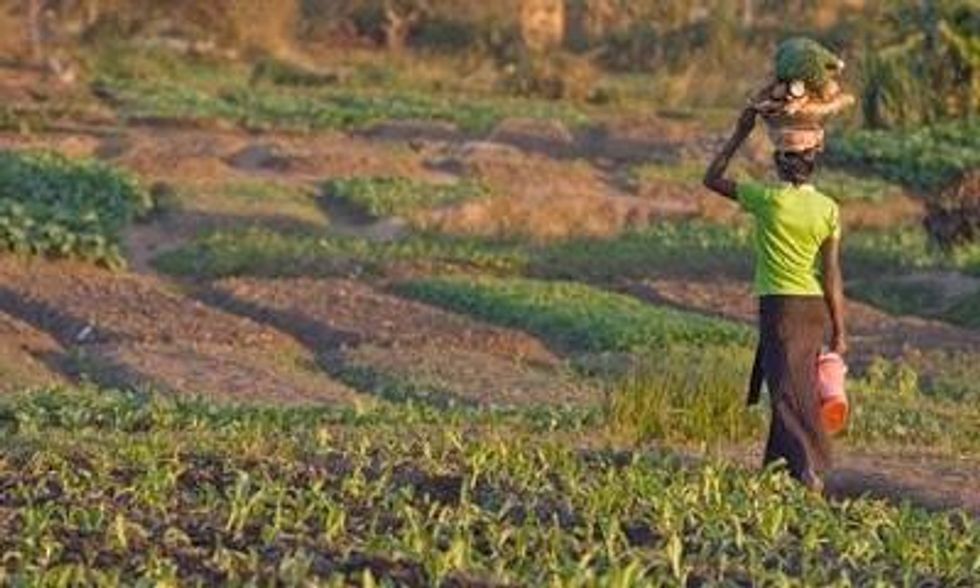Today is International Women's Day - a day to recognize the steps that have been taken to improve gender equality and to acknowledge that much more needs to be done to level the playing field for women in all sectors, including agriculture.
Olivier De Shutter, the U.N. Special Rapporteur on the Right to Food, recently wrote an op-ed in The New York Times, The Feminization of Farming, drawing attention to the need to empower women farmers and remove the obstacles that hold them back from improving agricultural productivity, nutrition, and incomes. He says that"the most effective strategies to empower women who tend farm and family -- and to alleviate hunger in the process -- are to remove the obstacles that hinder them from taking charge of their lives."
According to the U.N. Food and Agriculture Organization, 40 percent of agricultural laborers in developing countries are women - and in some countries, they are as much as 80 percent of the agricultural work force. But women farmers' yields are roughly 20-30 percent less than male farmers.
If gender barriers were eliminated and women farmers were able to match the yields of male farmers, global malnourishment could be reduced by 12 to 17 percent. And a study conducted by the International Food Policy Research Institute found that almost 55 percent of the reduction in hunger from 1970 to 1995 could be attributed to improvements in women's status in society. In our guest post on Ecoagriculture Parners Landscapes for People, Food, and Nature blog, we highlight how providing better access to credit and inputs can not only improve the livelihoods of women farmers, but translates to better nutrition for their families.
In honor of International Women's Day, Ellen Gustafson and I want to highlight seven women working to change the food system:
Jeomek Bak
Bak is the Chairperson of the Korean Women Peasants Association. The Korean Women's Peasant Association (KWPA) is a national organization of women farmers based in Seoul, South Korea. In 2012, Bak accepted the Food Sovereignty Prize, which recognizes the Association for its work "promoting food sovereignty, women's rights, and the survival of small-scale Korean farmers." KWPA helped create the National Campaign Task Force, which focuses on defending food sovereignty in South Korea. In addition, the group organizes training programs, runs the Our Sisters Garden linking women farmers and local consumers, and their Native Seed Campaign focuses on preserving Indigenous seed varieties.
Barbara Buchner
Buchner is a member of the Barilla Center for Food & Nutrition Advisory Board and is the head of CPI Europe. Her work focuses on international climate finance and market-based mechanisms and other policy approaches to mitigating greenhouse gas emissions. Her experience is important to Barilla's research, making sure that agriculture is brought into the discussion of climate change at the international level.
Debra Eschmeyer
Eschmeyer is the co-Founder of FoodCorps and an organic farmer. FoodCorps helps connect kids to the food system by placing leaders in communities for a year. They teach students about where food comes from and healthy eating habits, and they establish school gardens. Eschmeyer is a recipient of the James Beard Foundation Leadership Award and serves on the advisory board of AGree.
Wenonah Hauter
Hauter is the Executive Director of Food & Water Watch. Her recent book Foodopoly: The Battle Over the Future of Food and Farming in America looks at corporate consolidation of the food system and the impacts on producers and eaters.From 1997 to 2005 she served as Director of Public Citizen's Energy and Environment Program, focusing on water, food, and energy policy. She was also the environmental policy director for Citizen Action, where she worked with the organization's 30 state-based groups, and she coordinated sustainable energy campaigns at the Union of Concerned Scientists.
Saru Jayaramane
Jayaraman is the Director of the Food Labor Research Center and co-Founder of theRestaurant Opportunities Centers United. In the book, Behind the Kitchen Door, Jayaraman and co-author Eric Schlosser, highlight the need for foodies to recognize that sustainable food is not just about eating local or organic-a truly sustainable restaurant is one in which wait staff and cooks are treated fairly and make a living wage, and where workers and eaters alike have a positive experience.
Sophia Murphy
Murphy is a Senior Advisor for the Institute on Agriculture and Trade Policy. Her work focuses on U.S. trade and agricultural policy and the impact of trade rules on farmers in developing countries. She has also written about the impacts of international trade on development and food security, corporate concentration in the food system, the affect of biofuels on poverty, and the impact of aid programs.
Lindiwe Sibanda
Sibanda is the Chief Executive Officer of the Food and Natural Resources Policy Analysis Network (FANRPAN) based in Pretoria, South Africa. Sibanda has led FANRPAN's development strategy and is currently coordinating policy research and advocacy programs in Africa to improve food security in the region. In addition, she is Board Chair of the International Livestock Research Institute and she's part of the Guardian Global Development advisory panel. Sibanda also led the No Agriculture, No Deal global campaign in 2009 to advocate for the inclusion of agriculture in the United Nations Framework on Climate Change in Copenhagen.
Who are you celebrating this International Women's Day?



